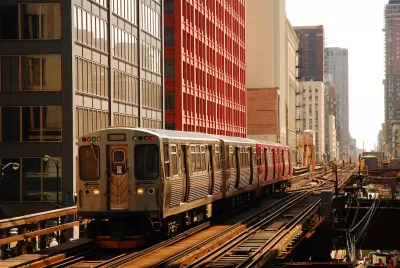State lawmakers say the move could cut down on competition and make regional transit more efficient for riders.

A proposed Illinois state bill known as the Metropolitan Mobility Authority Act would combine three Chicago-area transit agencies — Chicago Transit Authority, Metra, and Pace — into one agency, allowing riders to access all three systems with one universal fare. “The Metropolitan Mobility Authority Act is the first part of the Clean and Equitable Transportation Act, with Illinois' goal for the transportation industry 100% carbon-free by 2050,” explains Tara Molina for CBS News.
Proponents of the bill argue that a unified transit system would be “more sustainable, reliable and safe” for its riders and eliminate competition between agencies.
Molina describes the history of the three agencies, which stemmed from the 1974 establishment of the Regional Transportation Authority (RTA). “The Illinois General Assembly reorganized the structure and funding of the RTA in 1983, with operating responsibilities on three separate service boards – the CTA, and what became Metra and Pace.”
In response to requests for comment, all four agencies expressed openness to the idea of consolidation but emphasized the chronic underfunding that plagues each of them. According to a statement from the CTA, “To attribute the region's challenges to anything other than a funding shortage is to perpetuate a narrative that will – at best – serve as a distraction to the funding crisis we face.”
FULL STORY: Proposed new agency would combine Chicago Transit Authority, Metra, Pace

Trump Administration Could Effectively End Housing Voucher Program
Federal officials are eyeing major cuts to the Section 8 program that helps millions of low-income households pay rent.

Planetizen Federal Action Tracker
A weekly monitor of how Trump’s orders and actions are impacting planners and planning in America.

Ken Jennings Launches Transit Web Series
The Jeopardy champ wants you to ride public transit.

Tackling Soil Contamination With Nature-Based Solutions
Los Angeles County residents and experts are turning to nature-based methods like bioremediation to address long-standing and fire-exacerbated soil contamination without resorting to costly and disruptive removal.

Rebuilding Smarter: How LA County Is Guiding Fire-Ravaged Communities Toward Resilience
Los Angeles County is leading a coordinated effort to help fire-impacted communities rebuild with resilience by providing recovery resources, promoting fire-wise design, and aligning reconstruction with broader sustainability and climate goals.

When Borders Blur: Regional Collaboration in Action
As regional challenges outgrow city boundaries, “When Borders Blur” explores how cross-jurisdictional collaboration can drive smarter, more resilient urban planning, sharing real-world lessons from thriving partnerships across North America.
Urban Design for Planners 1: Software Tools
This six-course series explores essential urban design concepts using open source software and equips planners with the tools they need to participate fully in the urban design process.
Planning for Universal Design
Learn the tools for implementing Universal Design in planning regulations.
Ada County Highway District
Clanton & Associates, Inc.
Jessamine County Fiscal Court
Institute for Housing and Urban Development Studies (IHS)
City of Grandview
Harvard GSD Executive Education
Toledo-Lucas County Plan Commissions
Salt Lake City
NYU Wagner Graduate School of Public Service





























